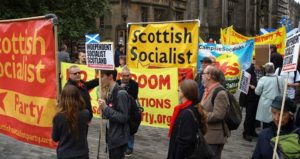This is a revised and adapted editorial by Ken Ferguson – editor of the Scottish Socialist Voice.
The announcement by Nicola Sturgeon of consultation on a second independence referendum bill – is placed firmly in the context of a weapon in the Brexit battle, not as a central objective necessary for a renewed just Scotland.
Leaving aside that independence referendum polls show that the EU issue is not one that moves people from No to Yes in great numbers and that 38% of 2014 Yes voters voted Leave; the real danger in this approach is that it reduces independence to a tactic in a wider Westminster war.
The reality of this was underlined after the SNP conference by insiders who said the aim was to project the First Minister as the main UK anti-“hard Brexit” figure, going all out to to defend Scotland’s place in the EU single market.
Tories play the same game
This is reminiscent of the much hyped but stillborn UK ‘progressive alliance’ which blazed meteor like across the UK general election sky only to disappear without trace. The real danger is that the Tories and the Westminster machine can play that same game while the wider case for independence goes unmade.
An independence referendum bill is not a tap to be turned off and on as the Scottish Government demands but a key irreducible democratic demand opening the way to a more socially just sustainable Scotland.
There is genuine debate in the broad Yes movement on the timing of a second referendum. Some of the signs coming out of the SNP conference will raise concerns among cross-party and no party campaigners.
Ideology
 For example, what will non-SNP Yes supporters make of the newly minted “moderate” SNP depute leader Angus Robertson’s call to put aside “ideology” on the drive to convince No voters to switch?
For example, what will non-SNP Yes supporters make of the newly minted “moderate” SNP depute leader Angus Robertson’s call to put aside “ideology” on the drive to convince No voters to switch?
Will socialists be expected to silence their criticisms of a deeply unequal society spawned by 30 years of neoliberal economics, and Greens to park pro environmental policies?
“Ideology” is not a term of abuse but the basis on which political activists from left to right understand the society they live in and come to conclusions that frame and inform policies to deal with the issues we face.
Diversity remains
In the 2014 referendum, it was the very diversity of the Yes movement which saw Nationalists work with Greens, Socialists, single issue campaigners and key non party groups such as Women for Independence and Radical Independence. This multifaceted approach was instrumental in boosting support for a Yes vote – from around 28% to the eventual 45% won on September 18th.
 Recreating such a diverse movement for a new campaign is already complicated by the fact that huge swathes of Yes supporters flowed into the SNP, transforming much of that campaign from a broad social movement to a party political one. It has reinforced the identification of independence as the sole possession of the SNP and increasingly runs the risk of tying the fortunes of the Yes movement to those of the SNP government.
Recreating such a diverse movement for a new campaign is already complicated by the fact that huge swathes of Yes supporters flowed into the SNP, transforming much of that campaign from a broad social movement to a party political one. It has reinforced the identification of independence as the sole possession of the SNP and increasingly runs the risk of tying the fortunes of the Yes movement to those of the SNP government.
Such a situation is fraught with danger for the task of winning a second referendum, and in turn places a heavy responsibility on all to ensure that all pro-Yes voices play their full part in shaping what has to be a renewed pluralist campaign to win.
Keeping The Pound – Again?
In this context, the remarks by John Swinney at a conference fringe meeting that he would favour basing the currency for an independent Scotland, using the pound sterling must ring alarm bells. At least this option, widely seen as a negative factor in 2014, must surely be tested in debate in the wider Yes movement and alternatives discussed.
[x_pullquote type=”right”][Independence] is not a lever to win European crumbs from Westminster’s table but a point of key democratic principle – which is absolutely neccessary to win a socialist society here in Scotland.[/x_pullquote]Nor can it just be taken as granted that the campaign can centre on a Scottish Government White Paper as in 2014, a paper now widely criticised as unambitious and painting a safety first “UK lite” vision. Diversity of ideas and visions on what independence can achieve can only strengthen that offer.However at the heart of the dilemma on how to win is where exactly does the option of independence fit into the complex post Brexit politics of Scotland. It is not a lever to win European crumbs from Westminster’s table but a point of key democratic principle – which is absolutely neccessary to win a socialist society here in Scotland.
